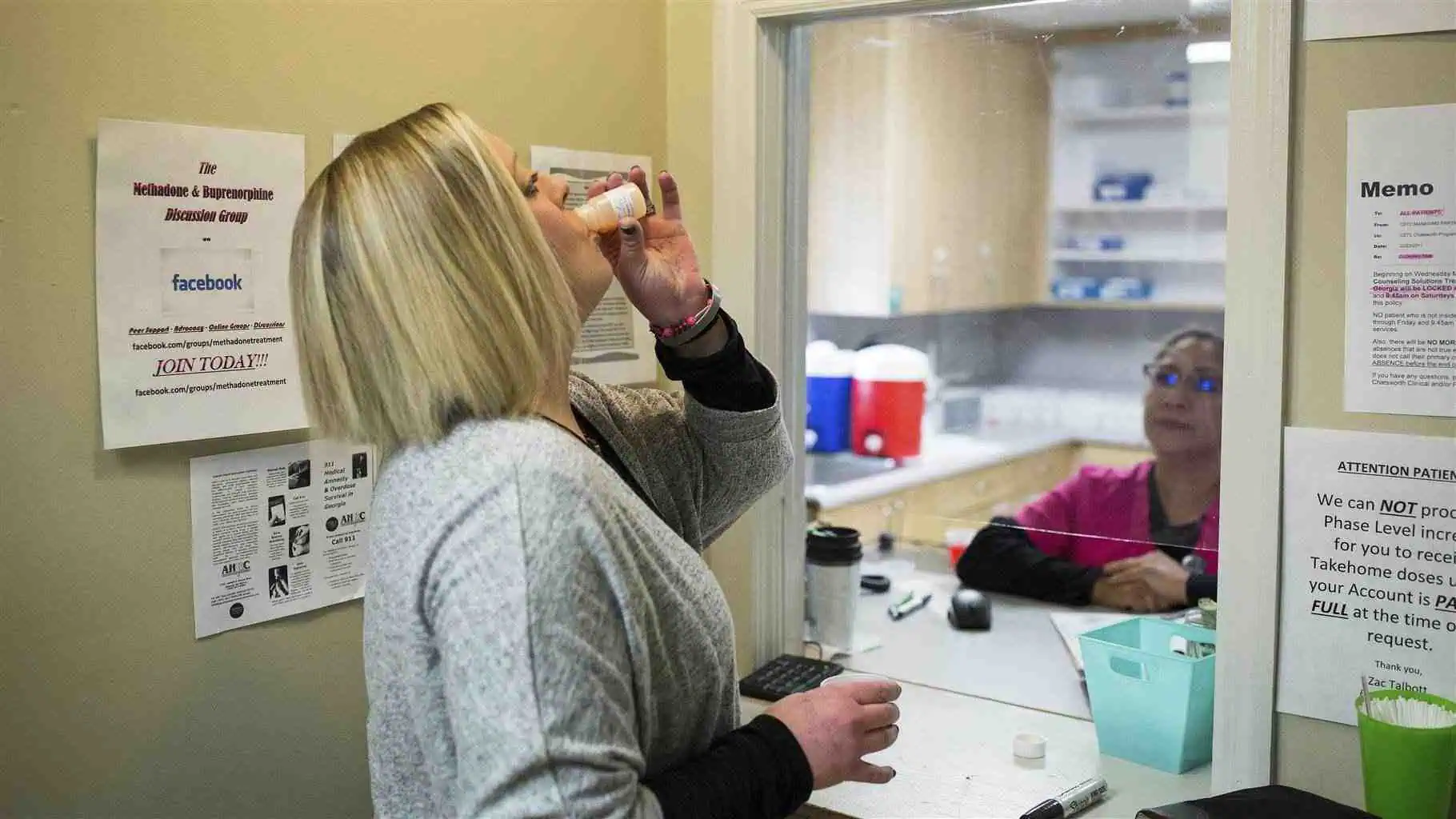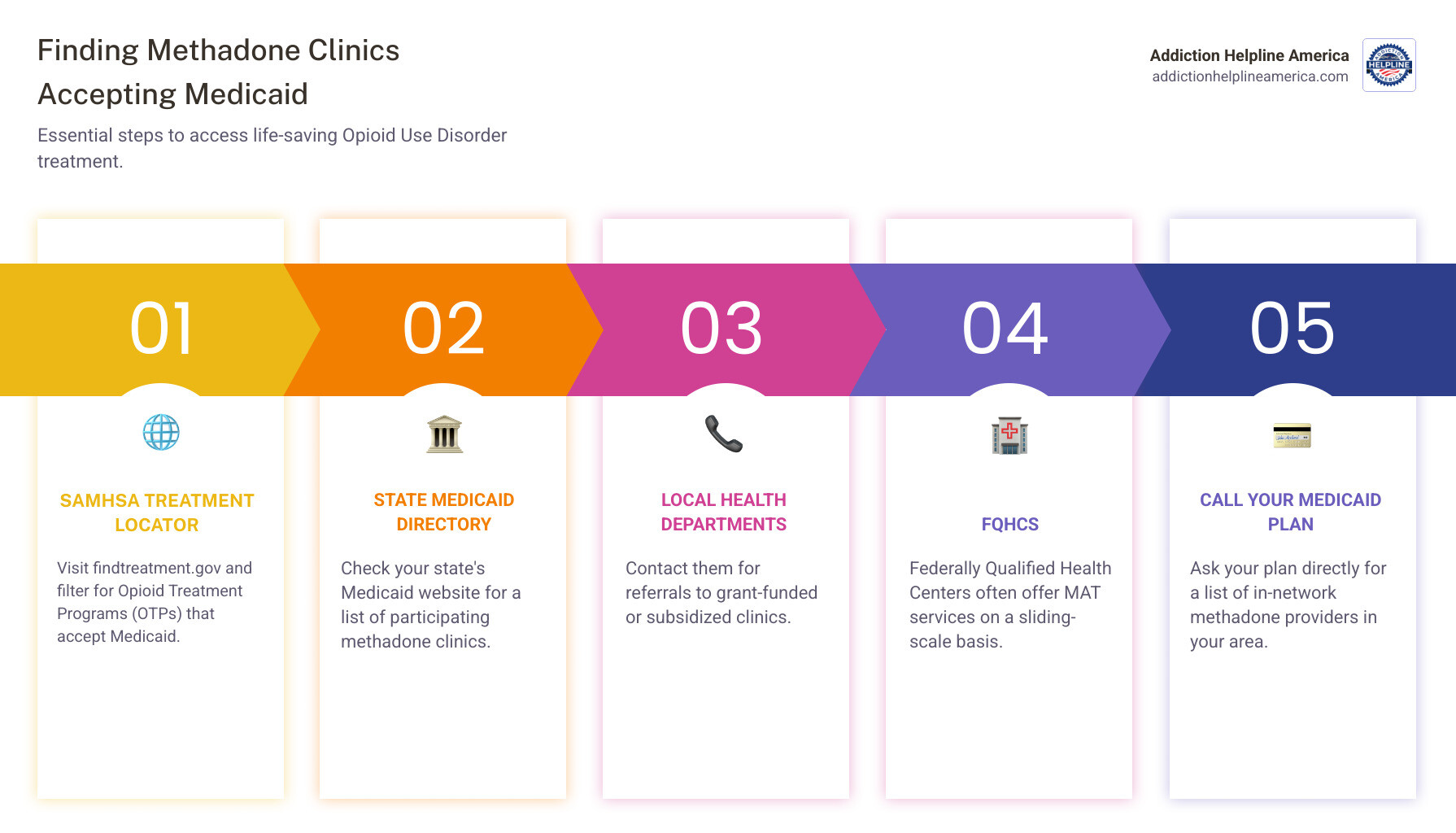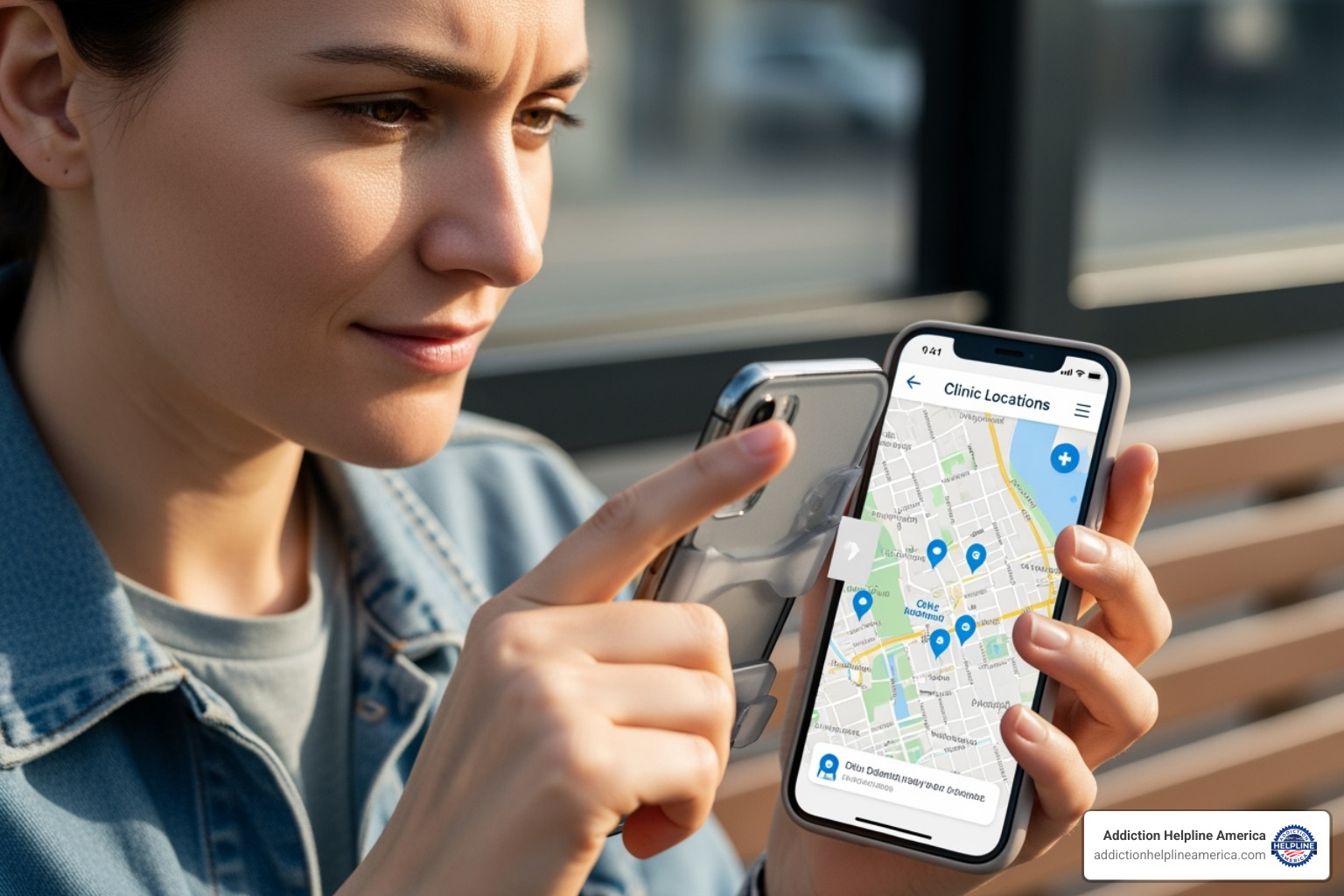
Why Finding Methadone Clinics That Accept Medicaid Matters for Your Recovery
Finding methadone clinics that accept medicaid near me is a critical step toward recovery. With nearly 108,000 Americans dying from drug overdoses in 2022, driven largely by opioids, the need for accessible, effective treatment is urgent. Methadone offers real hope.
Quick Ways to Find Covered Methadone Treatment:
- SAMHSA Treatment Locator – Visit findtreatment.gov and filter for Opioid Treatment Programs (OTPs) that accept Medicaid.
- Your State’s Medicaid Provider Directory – Check your state Medicaid website for participating methadone clinics.
- Local Health Departments – Contact them for referrals to grant-funded or subsidized clinics.
- Federally Qualified Health Centers (FQHCs) – Often offer MAT services on a sliding-scale basis.
- Call Your Medicaid Plan Directly – Ask for a list of in-network methadone providers in your area.
Methadone is an FDA-approved medication proven to treat opioid use disorder (OUD). It works by reducing cravings and withdrawal symptoms, cutting the risk of a fatal overdose by more than half and allowing you to stabilize your life and focus on recovery.
The biggest challenge is often affordability. Medicaid is a lifeline for over a million Americans seeking addiction care, but recent eligibility changes have left many without coverage, creating a crisis within a crisis. An interruption in methadone treatment dramatically increases the risk of overdose and death.
But you don’t have to face this alone. Whether you have Medicaid, are uninsured, or have limited coverage, options like sliding-scale fees and grant-funded programs exist. I’m Chris, CEO of Addiction Helpline America, and my team is dedicated to helping you steer these options. We work around the clock to ensure that cost never becomes a barrier between you and recovery.
Understanding Methadone Treatment and Its Benefits
Understanding your options is the first step. Methadone has been an FDA-approved, life-saving treatment for opioid use disorder (OUD) for over 50 years. Let’s break down how it works.
What is methadone and how does it work for opioid use disorder?
Methadone is a synthetic opioid agonist that activates opioid receptors in the brain slowly and steadily. Unlike the rapid high and crash from other opioids, it works to:
- Prevent withdrawal: It provides a stable dose of medication, so you don’t experience the agonizing symptoms that make it nearly impossible to quit on your own.
- Reduce cravings: It satisfies the brain’s need for opioids, quieting the constant urge to use.
- Block euphoric effects: If you use other opioids while on a stable dose of methadone, you won’t feel the same high, making illicit drug use less rewarding.
The result is a reduced overdose risk of more than 50% and the mental clarity to focus on rebuilding your life. This stability leads to higher treatment retention, which is a key predictor of long-term success.
How do methadone clinics work, and what services do they offer?
Methadone clinics that accept medicaid near me, officially called Opioid Treatment Programs (OTPs), are comprehensive centers providing more than just medication. Services include:
- Supervised Dosing: Daily supervised dosing, especially early in treatment, ensures safety and proper dose management.
- Medical Evaluations: Regular monitoring by doctors to manage your health and adjust medication as needed.
- Counseling and Behavioral Therapies: Individual, group, and family therapy are required to address the psychological aspects of addiction.
- Drug Testing: Routine testing is used as a clinical tool to monitor progress and adjust your treatment plan.
- Case Management: Staff helps you with practical needs like housing, employment, and legal issues.
Who qualifies for methadone treatment, and what are the eligibility criteria?
To qualify for methadone treatment, you generally must:
- Be 18 or older.
- Have a history of opioid addiction for at least one year.
- Show current physiological dependence on opioids.
- Receive a formal diagnosis of OUD from a healthcare provider.
- Voluntarily consent to treatment.
Note: Pregnant individuals with OUD are often prioritized for immediate admission to protect both mother and baby.
What is Medication-Assisted Treatment (MAT)?
Medication-Assisted Treatment (MAT) is the gold standard for OUD care. It combines FDA-approved medications like methadone with counseling and behavioral therapies. This whole-patient approach treats addiction as the chronic brain disease it is. MAT stabilizes brain chemistry with medication, allowing you to fully engage in therapy to develop coping skills, process trauma, and build a new life. Studies consistently show MAT leads to reduced drug use, lower overdose rates, and better long-term recovery.
The Crucial Role of Counseling in Recovery
While medication stabilizes your body, counseling is essential for healing your mind. It gives you the tools to address the root causes of addiction and build a sustainable recovery. Individual therapy helps you develop coping skills, group therapy provides peer support, and family counseling can mend relationships. Therapies like Cognitive Behavioral Therapy (CBT) are particularly effective for learning relapse prevention skills. This comprehensive support system is what makes recovery not just possible, but sustainable.
How to Find Methadone Clinics That Accept Medicaid Near Me
Finding a methadone clinic that accepts medicaid near me can feel overwhelming, as coverage and availability vary by state. The key is to verify your insurance and know the right questions to ask. A little preparation can save you a lot of frustration and get you into treatment faster.
Step-by-Step Guide to Locating a Clinic
Follow this roadmap to find a clinic that meets your needs:
- Use the SAMHSA Treatment Locator. Visit dpt2.samhsa.gov/treatment/directory.aspx and filter your search for “Opioid Treatment Programs” and “Medicaid.”
- Check Your State’s Medicaid Directory. Your state’s Medicaid or health department website maintains a directory of in-network providers.
- Call Your Medicaid Plan Directly. The customer service number on your insurance card is a direct line to a representative who can list in-network clinics and explain your benefits.
- Look for Federally Qualified Health Centers (FQHCs). These community clinics serve everyone regardless of ability to pay, often on a sliding scale. Find them via the HRSA website.
- Contact Your Local Health Department. Your county or city health department can refer you to grant-funded or state-subsidized programs.
- Let Addiction Helpline America Help. This is what we do. Our team provides free, confidential guidance to connect you with a program that accepts your insurance, saving you time and stress.
What If I Don’t Have Medicaid or Am Uninsured?
If you’re uninsured, you still have options. Recovery is not just for those with good insurance. Look for:
- Free clinics and grant-funded programs supported by federal and state money.
- Clinics with sliding-scale fees that base cost on your income.
- State-funded programs for residents who don’t qualify for other coverage.
- Programs supported by opioid settlement funds, which are expanding access in many communities.
Addiction Helpline America specializes in finding these affordable pathways to treatment for everyone.
Overcoming Common Barriers to Accessing Treatment
You might still face problems. Here’s how to overcome them:
- Transportation: Many clinics know this is a challenge and may offer bus passes, shuttles, or other assistance. Always ask what’s available.
- Waitlists: If a clinic has a waitlist, ask for interim support or referrals to other facilities. Pregnant individuals are typically prioritized.
- Documentation: If you’re missing paperwork like an ID or proof of residency, ask a case manager for help. They can often find workarounds.
- Stigma: Methadone is a legitimate medical treatment. You are treating a disease, and there is no shame in seeking help.
- Medicaid Unwinding: As of September 2023, millions lost Medicaid after pandemic protections ended. If this happened to you, contact your state Medicaid agency immediately to see if you can reapply or appeal. You can track state-by-state data via the Medicaid enrollment and unwinding tracker.
Our helpline can assist you in navigating all these barriers.
What to Expect: From Your First Visit to Ongoing Care
Walking into an Opioid Treatment Program (OTP) for the first time can be nerve-wracking, but these are structured, supportive environments regulated for your safety. The staff at methadone clinics that accept medicaid near me understand what you’re going through and are there to help you succeed.
Your First Visit to a Methadone Clinic that Accepts Medicaid Near Me
Your first visit is about creating a personalized treatment plan. The process typically takes a few hours and includes several key steps:
- Intake and Assessment: You’ll meet with a counselor to discuss your medical and substance use history.
- Medical Evaluation: A doctor or nurse will conduct a physical exam and health assessment.
- Urine Drug Screen: A standard safety measure to confirm opioid use and identify other substances for safe dosing.
- Treatment Planning: The clinical team will work with you to create an individualized plan.
- Consent Forms: You’ll sign forms that explain the program’s policies, benefits, and risks.
- First Dose: You will receive your first supervised dose of methadone at the clinic.
Being honest throughout this process is crucial for your safety and the effectiveness of your treatment.
Ongoing Treatment and Earning Take-Home Doses
After your intake, treatment settles into a routine. Initially, you’ll visit the clinic daily for supervised dosing. This daily structure allows the medical team to monitor your response and safely adjust your dose until cravings and withdrawal symptoms are eliminated without causing sedation.
Regular drug tests and counseling sessions are required parts of your treatment. The tests are clinical tools to track progress, not to punish you. Counseling is vital for addressing the root causes of addiction and developing coping skills for long-term recovery.
As you demonstrate stability through consistent attendance and negative drug screens, you become eligible to earn take-home doses. Federal guidelines, which were updated following the COVID-19 pandemic, allow patients to gradually reduce clinic visits—from daily to weekly, or even monthly for those with years of stability. You can learn more about the current standards in the Methadone Take-Home Flexibilities Extension Guidelines.
Earning take-homes is a major milestone that restores flexibility and signifies the trust you’ve built with your treatment team. The duration of treatment is entirely individual; some people use methadone for a few months, while others benefit from long-term maintenance. The decision is always made between you and your provider, focused on your sustained health and well-being.
Important Considerations: Safety, Alternatives, and Regulations
Making an informed decision about your care means understanding the safety protocols, alternatives, and regulations surrounding methadone treatment.
Potential Side Effects and Safety Protocols
Methadone is safe when used as prescribed at a methadone clinic that accepts medicaid near me, but it’s a powerful medication. Common side effects include drowsiness, constipation, and sweating. The most serious risk is respiratory depression (slowed breathing), which is why safety protocols are so strict.
To ensure your safety:
- Your dose will be started low and increased gradually.
- You must be completely honest with your provider about all other drugs and alcohol you use.
- Never mix methadone with other depressants like alcohol or benzodiazepines (e.g., Xanax, Valium), as this combination can be fatal.
Following your treatment plan exactly as prescribed is the best way to protect yourself.
How does methadone treatment differ for pregnant or breastfeeding women?
For pregnant women with OUD, methadone is the recommended standard of care. Untreated addiction poses far greater risks to both mother and baby than medically supervised treatment. Pregnant individuals are given priority for admission to clinics and receive integrated prenatal care.
While newborns may experience a treatable withdrawal syndrome (Neonatal Abstinence Syndrome, or NAS), the benefits of a stable pregnancy on methadone far outweigh this risk. Breastfeeding is also considered safe and is encouraged, as it can help lessen NAS symptoms and promote bonding.
Alternatives to Methadone Treatment
Methadone is highly effective, but it’s not the only FDA-approved medication for OUD. The goal is to find the right fit for you.
- Buprenorphine (Suboxone): This is a partial opioid agonist, meaning it has a “ceiling effect” that lowers the risk of misuse and overdose. It can be prescribed in a doctor’s office, offering more flexibility than daily clinic visits.
- Naltrexone (Vivitrol): This is an opioid antagonist, meaning it blocks opioid receptors entirely. It is non-addictive and available as a monthly injection, but it requires you to be fully detoxed from all opioids before starting.
These medications are different tools for recovery. Our team at Addiction Helpline America can help you understand the differences and find a program offering the MAT option that’s best for you.
Current Regulations and Viewpoints on Methadone
Methadone access is shaped by strict federal and state regulations. This can lead to inconsistencies, like different take-home rules in different states. There is an ongoing debate about modernizing these rules, such as through the proposed Modernizing Opioid Treatment Access Act (M-OTAA), to expand access beyond the specialized clinic setting. Proponents believe this could reduce barriers, while critics worry about safety. You can read more on this topic in articles like “Methadone in Primary Care”.
While the medical community recognizes methadone as a vital, life-saving treatment, public stigma and regulatory problems continue to be significant barriers to care.
Frequently Asked Questions about Methadone Treatment
We’ve helped thousands of people explore their treatment options. Here are answers to some of the most common questions we hear.
Who is eligible for methadone treatment at a clinic that accepts Medicaid near me?
Generally, you are eligible for treatment if you are at least 18 years old, have a documented history of opioid addiction for at least one year, and have a current physiological dependence confirmed by a medical provider. To use your benefits at a methadone clinic that accepts medicaid near me, you must be enrolled in your state’s Medicaid program and choose a clinic that is a participating provider. Our helpline can assist you in verifying both your treatment eligibility and insurance coverage.
Is methadone just replacing one addiction with another?
No. This is a common and harmful myth. Illicit opioid use creates a chaotic cycle of highs and lows. Medically supervised methadone treatment provides a stable, controlled dose that normalizes brain chemistry without producing a high. It allows you to function, work, and heal. Think of it like insulin for a person with diabetes—it’s a necessary medication that treats a chronic disease. This is recovery, not a replacement addiction.
How long does methadone treatment last?
There is no set timeline; the duration of treatment is a personal decision made between you and your medical provider. Some people use methadone for short-term detoxification over a period of months. For others, long-term maintenance treatment lasting years, or even a lifetime, provides the stability needed to sustain recovery. Both paths are valid forms of recovery. If you and your provider decide tapering is the right choice, it will be done slowly and safely to minimize withdrawal and prevent relapse.
Conclusion
The key takeaway is this: methadone clinics that accept medicaid near me are a life-saving resource. Methadone is not a substitute addiction; it is an FDA-approved medical treatment that stabilizes brain chemistry, cuts overdose risk by more than half, and allows you to rebuild your life. With nearly 108,000 overdose deaths in 2022, accessing this care is more critical than ever.
While barriers like cost and the recent Medicaid unwinding exist, options are available. At Addiction Helpline America, our team works around the clock to provide free, confidential guidance. We connect you to treatment programs that fit your needs, whether you have Medicaid, are uninsured, or have other coverage. Cost should not stand in the way of recovery.
Taking the first step is the hardest, but you don’t have to do it alone. If you’re ready to find help, we’re here for you. Recovery is possible, and it starts now.
Our helpline is 100%
free & confidential
If you or someone you care about is struggling with drug or alcohol addiction, we can help you explore your recovery options. Don’t face this challenge alone—seek support from us.
Programs
Resources
Will my insurance
cover addiction
treatment?
We're ready to help
Find the best
drug or alcohol treatment
center
Are you or a loved one struggling with addiction? Call today to speak to a treatment expert.
















